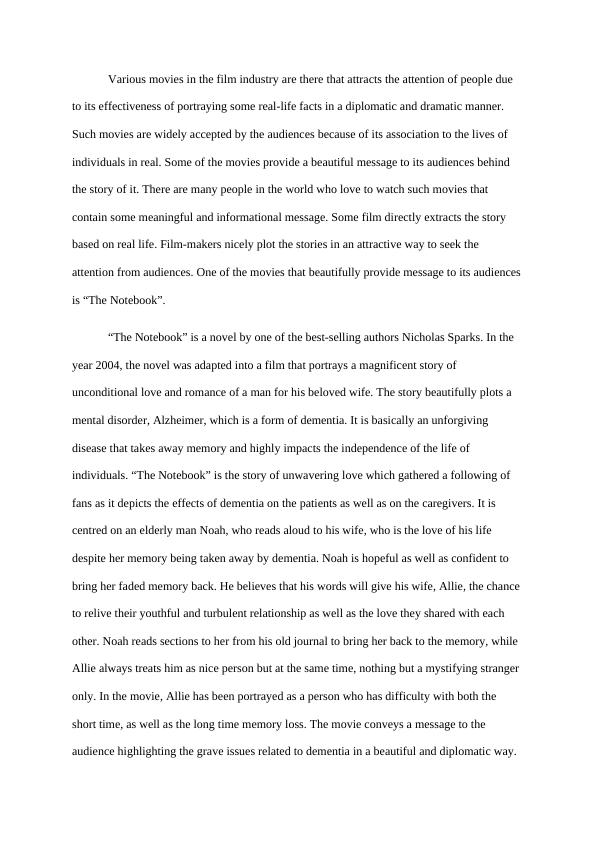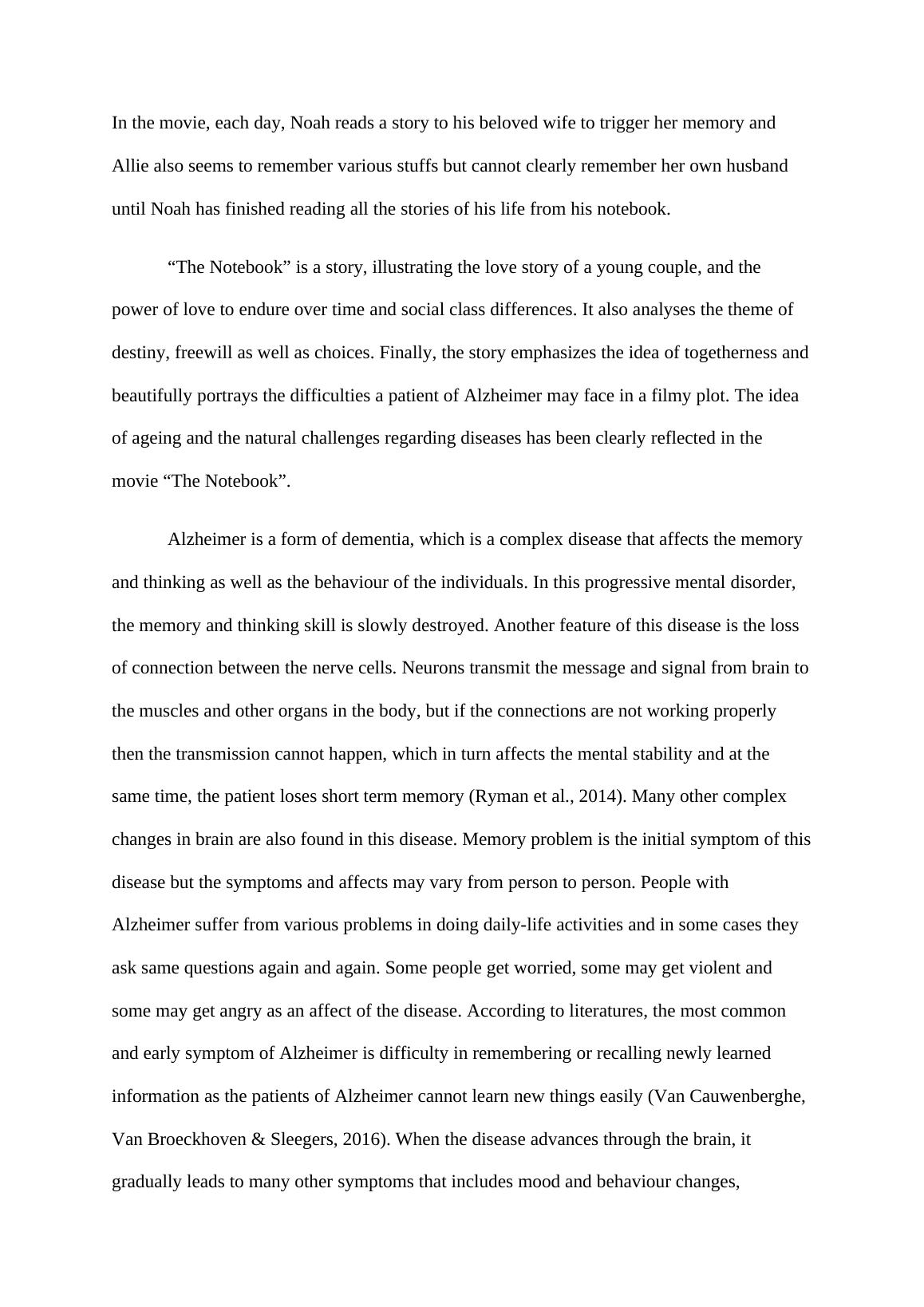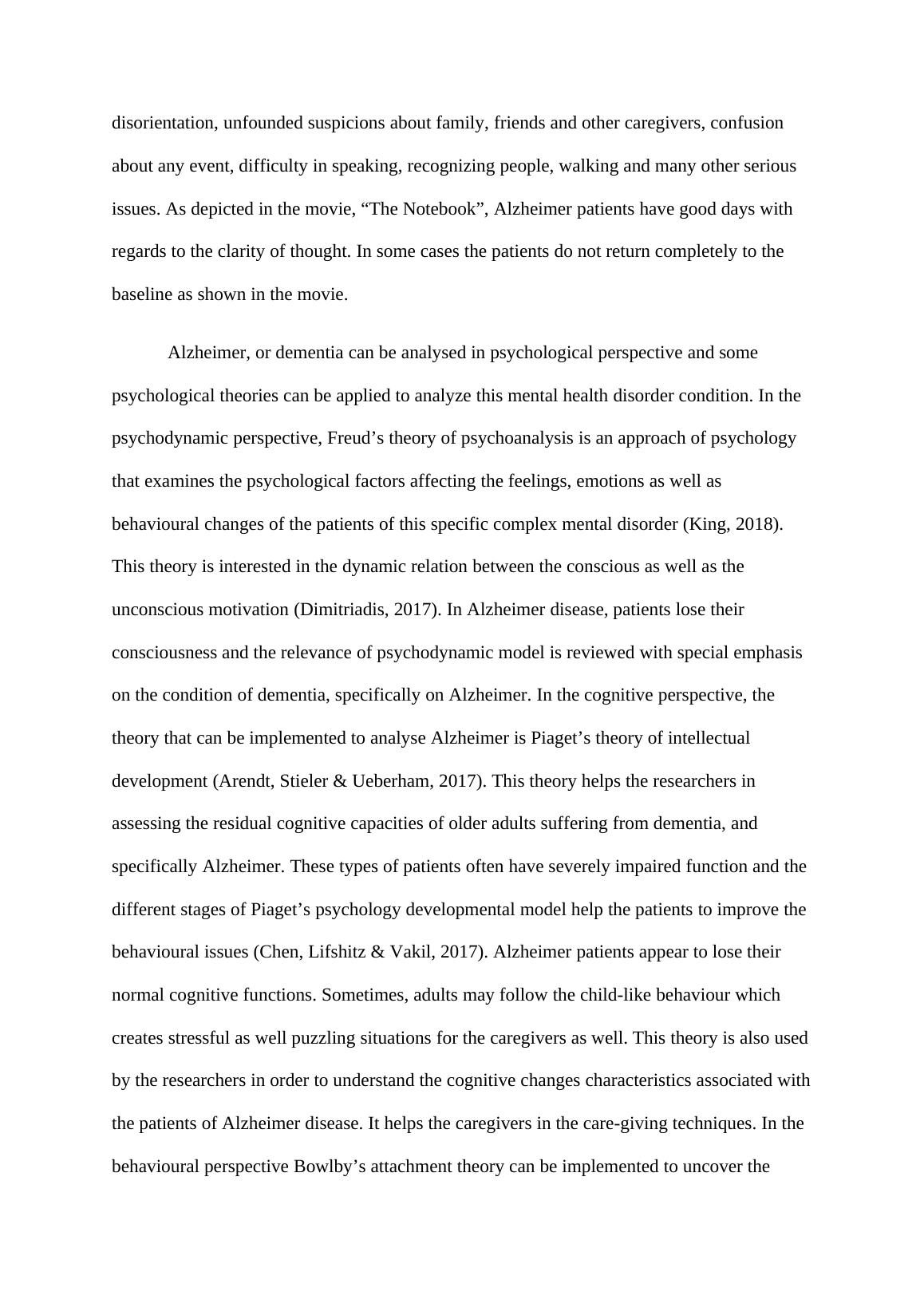The Notebook: A Beautiful Portrayal of Love and Alzheimer's
Added on 2023-05-30
6 Pages1898 Words238 Views
Various movies in the film industry are there that attracts the attention of people due
to its effectiveness of portraying some real-life facts in a diplomatic and dramatic manner.
Such movies are widely accepted by the audiences because of its association to the lives of
individuals in real. Some of the movies provide a beautiful message to its audiences behind
the story of it. There are many people in the world who love to watch such movies that
contain some meaningful and informational message. Some film directly extracts the story
based on real life. Film-makers nicely plot the stories in an attractive way to seek the
attention from audiences. One of the movies that beautifully provide message to its audiences
is “The Notebook”.
“The Notebook” is a novel by one of the best-selling authors Nicholas Sparks. In the
year 2004, the novel was adapted into a film that portrays a magnificent story of
unconditional love and romance of a man for his beloved wife. The story beautifully plots a
mental disorder, Alzheimer, which is a form of dementia. It is basically an unforgiving
disease that takes away memory and highly impacts the independence of the life of
individuals. “The Notebook” is the story of unwavering love which gathered a following of
fans as it depicts the effects of dementia on the patients as well as on the caregivers. It is
centred on an elderly man Noah, who reads aloud to his wife, who is the love of his life
despite her memory being taken away by dementia. Noah is hopeful as well as confident to
bring her faded memory back. He believes that his words will give his wife, Allie, the chance
to relive their youthful and turbulent relationship as well as the love they shared with each
other. Noah reads sections to her from his old journal to bring her back to the memory, while
Allie always treats him as nice person but at the same time, nothing but a mystifying stranger
only. In the movie, Allie has been portrayed as a person who has difficulty with both the
short time, as well as the long time memory loss. The movie conveys a message to the
audience highlighting the grave issues related to dementia in a beautiful and diplomatic way.
to its effectiveness of portraying some real-life facts in a diplomatic and dramatic manner.
Such movies are widely accepted by the audiences because of its association to the lives of
individuals in real. Some of the movies provide a beautiful message to its audiences behind
the story of it. There are many people in the world who love to watch such movies that
contain some meaningful and informational message. Some film directly extracts the story
based on real life. Film-makers nicely plot the stories in an attractive way to seek the
attention from audiences. One of the movies that beautifully provide message to its audiences
is “The Notebook”.
“The Notebook” is a novel by one of the best-selling authors Nicholas Sparks. In the
year 2004, the novel was adapted into a film that portrays a magnificent story of
unconditional love and romance of a man for his beloved wife. The story beautifully plots a
mental disorder, Alzheimer, which is a form of dementia. It is basically an unforgiving
disease that takes away memory and highly impacts the independence of the life of
individuals. “The Notebook” is the story of unwavering love which gathered a following of
fans as it depicts the effects of dementia on the patients as well as on the caregivers. It is
centred on an elderly man Noah, who reads aloud to his wife, who is the love of his life
despite her memory being taken away by dementia. Noah is hopeful as well as confident to
bring her faded memory back. He believes that his words will give his wife, Allie, the chance
to relive their youthful and turbulent relationship as well as the love they shared with each
other. Noah reads sections to her from his old journal to bring her back to the memory, while
Allie always treats him as nice person but at the same time, nothing but a mystifying stranger
only. In the movie, Allie has been portrayed as a person who has difficulty with both the
short time, as well as the long time memory loss. The movie conveys a message to the
audience highlighting the grave issues related to dementia in a beautiful and diplomatic way.

In the movie, each day, Noah reads a story to his beloved wife to trigger her memory and
Allie also seems to remember various stuffs but cannot clearly remember her own husband
until Noah has finished reading all the stories of his life from his notebook.
“The Notebook” is a story, illustrating the love story of a young couple, and the
power of love to endure over time and social class differences. It also analyses the theme of
destiny, freewill as well as choices. Finally, the story emphasizes the idea of togetherness and
beautifully portrays the difficulties a patient of Alzheimer may face in a filmy plot. The idea
of ageing and the natural challenges regarding diseases has been clearly reflected in the
movie “The Notebook”.
Alzheimer is a form of dementia, which is a complex disease that affects the memory
and thinking as well as the behaviour of the individuals. In this progressive mental disorder,
the memory and thinking skill is slowly destroyed. Another feature of this disease is the loss
of connection between the nerve cells. Neurons transmit the message and signal from brain to
the muscles and other organs in the body, but if the connections are not working properly
then the transmission cannot happen, which in turn affects the mental stability and at the
same time, the patient loses short term memory (Ryman et al., 2014). Many other complex
changes in brain are also found in this disease. Memory problem is the initial symptom of this
disease but the symptoms and affects may vary from person to person. People with
Alzheimer suffer from various problems in doing daily-life activities and in some cases they
ask same questions again and again. Some people get worried, some may get violent and
some may get angry as an affect of the disease. According to literatures, the most common
and early symptom of Alzheimer is difficulty in remembering or recalling newly learned
information as the patients of Alzheimer cannot learn new things easily (Van Cauwenberghe,
Van Broeckhoven & Sleegers, 2016). When the disease advances through the brain, it
gradually leads to many other symptoms that includes mood and behaviour changes,
Allie also seems to remember various stuffs but cannot clearly remember her own husband
until Noah has finished reading all the stories of his life from his notebook.
“The Notebook” is a story, illustrating the love story of a young couple, and the
power of love to endure over time and social class differences. It also analyses the theme of
destiny, freewill as well as choices. Finally, the story emphasizes the idea of togetherness and
beautifully portrays the difficulties a patient of Alzheimer may face in a filmy plot. The idea
of ageing and the natural challenges regarding diseases has been clearly reflected in the
movie “The Notebook”.
Alzheimer is a form of dementia, which is a complex disease that affects the memory
and thinking as well as the behaviour of the individuals. In this progressive mental disorder,
the memory and thinking skill is slowly destroyed. Another feature of this disease is the loss
of connection between the nerve cells. Neurons transmit the message and signal from brain to
the muscles and other organs in the body, but if the connections are not working properly
then the transmission cannot happen, which in turn affects the mental stability and at the
same time, the patient loses short term memory (Ryman et al., 2014). Many other complex
changes in brain are also found in this disease. Memory problem is the initial symptom of this
disease but the symptoms and affects may vary from person to person. People with
Alzheimer suffer from various problems in doing daily-life activities and in some cases they
ask same questions again and again. Some people get worried, some may get violent and
some may get angry as an affect of the disease. According to literatures, the most common
and early symptom of Alzheimer is difficulty in remembering or recalling newly learned
information as the patients of Alzheimer cannot learn new things easily (Van Cauwenberghe,
Van Broeckhoven & Sleegers, 2016). When the disease advances through the brain, it
gradually leads to many other symptoms that includes mood and behaviour changes,

disorientation, unfounded suspicions about family, friends and other caregivers, confusion
about any event, difficulty in speaking, recognizing people, walking and many other serious
issues. As depicted in the movie, “The Notebook”, Alzheimer patients have good days with
regards to the clarity of thought. In some cases the patients do not return completely to the
baseline as shown in the movie.
Alzheimer, or dementia can be analysed in psychological perspective and some
psychological theories can be applied to analyze this mental health disorder condition. In the
psychodynamic perspective, Freud’s theory of psychoanalysis is an approach of psychology
that examines the psychological factors affecting the feelings, emotions as well as
behavioural changes of the patients of this specific complex mental disorder (King, 2018).
This theory is interested in the dynamic relation between the conscious as well as the
unconscious motivation (Dimitriadis, 2017). In Alzheimer disease, patients lose their
consciousness and the relevance of psychodynamic model is reviewed with special emphasis
on the condition of dementia, specifically on Alzheimer. In the cognitive perspective, the
theory that can be implemented to analyse Alzheimer is Piaget’s theory of intellectual
development (Arendt, Stieler & Ueberham, 2017). This theory helps the researchers in
assessing the residual cognitive capacities of older adults suffering from dementia, and
specifically Alzheimer. These types of patients often have severely impaired function and the
different stages of Piaget’s psychology developmental model help the patients to improve the
behavioural issues (Chen, Lifshitz & Vakil, 2017). Alzheimer patients appear to lose their
normal cognitive functions. Sometimes, adults may follow the child-like behaviour which
creates stressful as well puzzling situations for the caregivers as well. This theory is also used
by the researchers in order to understand the cognitive changes characteristics associated with
the patients of Alzheimer disease. It helps the caregivers in the care-giving techniques. In the
behavioural perspective Bowlby’s attachment theory can be implemented to uncover the
about any event, difficulty in speaking, recognizing people, walking and many other serious
issues. As depicted in the movie, “The Notebook”, Alzheimer patients have good days with
regards to the clarity of thought. In some cases the patients do not return completely to the
baseline as shown in the movie.
Alzheimer, or dementia can be analysed in psychological perspective and some
psychological theories can be applied to analyze this mental health disorder condition. In the
psychodynamic perspective, Freud’s theory of psychoanalysis is an approach of psychology
that examines the psychological factors affecting the feelings, emotions as well as
behavioural changes of the patients of this specific complex mental disorder (King, 2018).
This theory is interested in the dynamic relation between the conscious as well as the
unconscious motivation (Dimitriadis, 2017). In Alzheimer disease, patients lose their
consciousness and the relevance of psychodynamic model is reviewed with special emphasis
on the condition of dementia, specifically on Alzheimer. In the cognitive perspective, the
theory that can be implemented to analyse Alzheimer is Piaget’s theory of intellectual
development (Arendt, Stieler & Ueberham, 2017). This theory helps the researchers in
assessing the residual cognitive capacities of older adults suffering from dementia, and
specifically Alzheimer. These types of patients often have severely impaired function and the
different stages of Piaget’s psychology developmental model help the patients to improve the
behavioural issues (Chen, Lifshitz & Vakil, 2017). Alzheimer patients appear to lose their
normal cognitive functions. Sometimes, adults may follow the child-like behaviour which
creates stressful as well puzzling situations for the caregivers as well. This theory is also used
by the researchers in order to understand the cognitive changes characteristics associated with
the patients of Alzheimer disease. It helps the caregivers in the care-giving techniques. In the
behavioural perspective Bowlby’s attachment theory can be implemented to uncover the

End of preview
Want to access all the pages? Upload your documents or become a member.
